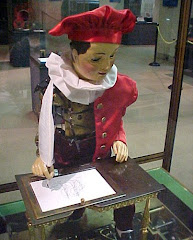Keeping it Real: The Authenticity of Experience in Practice-Led Research
The field of practice-based research in art, craft and design places a strong emphasis on "experiential" knowledge – the practitioner's capacity to "reflect" on her experience in/as/through/of practice (see, for example, Michael Biggs "Learning from Experience" and Rolf Hughes "Experience and Communication".
This presupposes a reflective, creative individual – in short, a modern concept of an autonomous, originating 'self'. Could a system or a machine be capable of reflective practice? Can a machine – or a semi-autonomous system – be truly 'creative'? What if a national research council were to offer funding to a project proposal in "artistic research" that had been generated by an inhuman 'author'? With this third assignment, we want you to play the roles of human, machine, and evaluator in the Turing Test (see related references in the posts/links below) to investigate whether this emphasis on the authenticity of human experience and its expression in creative forms precludes the possibility of a 'post-human' researcher in practice-led art, craft and design research. In our scenario, you have two chances to attract up to 5 million RD (= Research Dollars, an imaginary currency roughly compatible with the Swedish kronor in value) from the funding agency which will be represented by Alberto, myself and invited guest crits; one attempt through posing a significant research question using the existing art, craft and design skills of your group, and the second attempt through devising a system capable of generating an "original" or "creative" design/art/craft artefact or process. You may (as we discussed on Thursday) present the outcome of the system or the system in action, but in either case be sure to document thoroughly every step of your research planning, design and execution. In order to ensure that participation is evenly spread across members of the different groups, every student is also asked to make available, on request, there own 'research journal' which documents this process, their contributions and the significance of the wider research questions posed and/or implied by their project.
The assignment therefore comprises three components and requirements:
1. By combining the existing art, craft and design skills within each interdisciplinary group, formulate a practice-led research proposal which investigates a theme of research significance beyond art, craft and design practice. (= Wetware component).
2. Design a system capable of generating questions/propositions/provocations of research significance and present this system (or a record of its outcomes) as 'authentic' research undertaken by a human practice-led research team. (= Hardware component).
3. Document your processes, research and methodologies via a blog or web site (one for each group) and be prepared to present orally a reflective and theoretically informed account of the significance of your project(s) – their achievements, limitations and/or failures (these too can be significant) – to your audience at the crit on Wednesday/Thursday (29th/30th October) of Week 44. (= Software component).
Based on a combination of your responses to the three requirements above, the 'research committee' (at present comprising Alberto and myself) will make a symbolic award of up to RD 5m to the group which we feel sets the most compelling research agenda, inspires the greatest faith in their ability to execute their investigation through their chosen methodologies, shows the greatest command of the tools and materials of art, craft and design in developing practice-led research, and is able most persuasively to communicate their research vision to an audience consisting not only of experts but also of the general public.
As always, Alberto and myself are available for discussion, consultation, advice etc. as required. Good luck!
Monday, 20 October 2008
Subscribe to:
Post Comments (Atom)




No comments:
Post a Comment